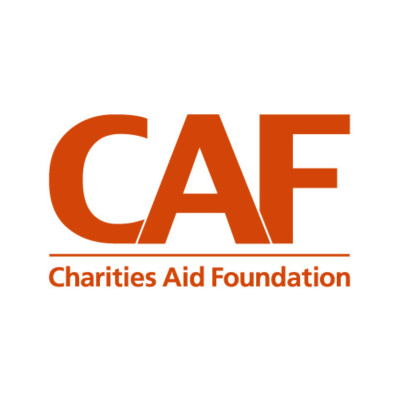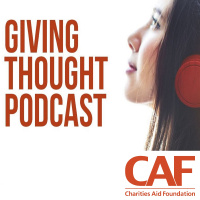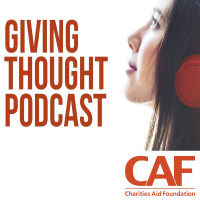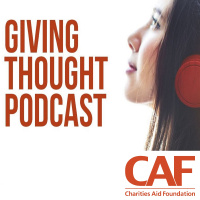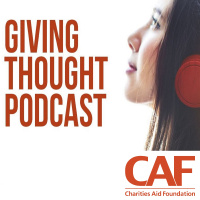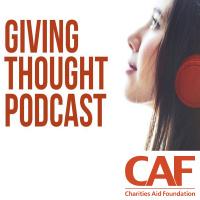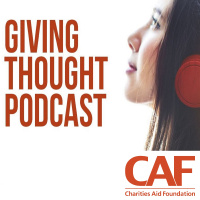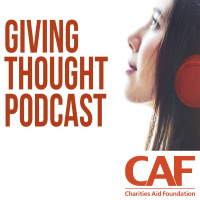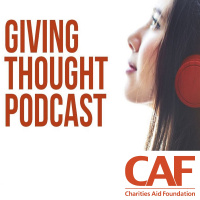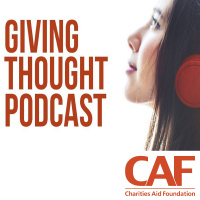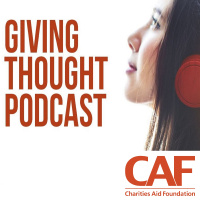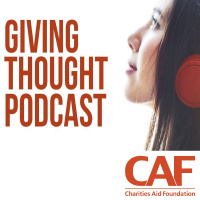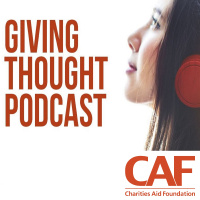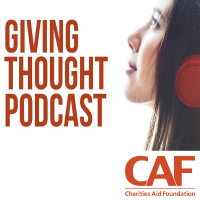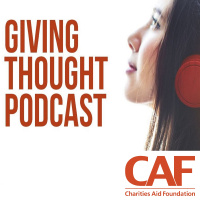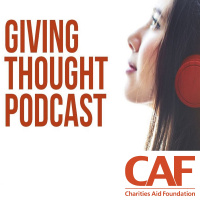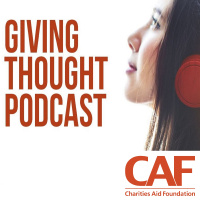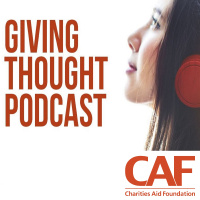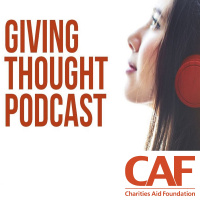Synopsis
Here goes nothing! We are pleased to launch the Giving Thought Podcast, brought to you by the Charities Aid Foundation's in house think-tank Giving Thought.In our first episode, we will be looking at the interplay between philanthropy, charity and politics. Given recent political events around the world and the trend for civil society activism to singled out for special scrutiny for its political influence this seems timely.We have decided to look at this issue from three interesting angles; Scrapping the Johnson amendment: What if President Trump follows through on his pledge to "destroy" the Johnson amendment which restricts the political lobbying of non profits and religious organisations? The emerging legal environment for Chinese civil society: New laws have made life much easier for donors and charities to operate ... as long as you agree with the government. Fake News: The proliferation of false stories targeted at specific audiences online raises problems for charities in getting their message across but also new needs for them to address. Read related content from Giving ThoughtAlgorithm Is Gonna Get You: what the rise of algorithms means for philanthropyAlgorithms are the automated decision processes that increasingly govern many aspects of our lives and the choices we make.Truth Decay: Philanthropy and the battle against misinformation and fake newsDoes philanthropy have a vital role to play in combating the widely-publicised threat of fake news?
Episodes
-
DVD Extra: Louise Pulford from SIX poses some questions to Rhod
27/10/2020 Duration: 19minIn this bonus DVD extra mini-episode, Louise Pulford - CEO of the Social Innovation Exchange (SIX) - turns the table on our host, Rhod Davies, and asks him for his thoughts on key trends affecting philanthropy now and post-pandemic.
-
The Current and Future State of Philanthropy, with Louise Pulford, Josiane Smith & Dame Julia Unwin
27/10/2020 Duration: 01h19minIn this episode, we talk to Louise Pulford, Josiane Smith and Dame Julia Unwin about the findings from a new global horizon scan by the Social Innovation Exchange (SIX), looking at the challenges and opportunities facing philanthropy post-Covid. In a wide-ranging conversation we discussed: How many trends in philanthropic funding we are seeing during the pandemic will lead to longer-term changes? How can we be more intentional about pursuing those we want to see? How has the pandemic accelerated or altered existing debates about philanthropy? What can we learn from historical examples of how philanthropy has responded to crises? Or from places in the world where crisis response is part of the normal role for philanthropy? To what extent is it true that “what we did before a crisis is who we are in a crisis”? i.e. is the response of different funders a reflection of their existing ethos and practice, or have some genuinely changed what they do? How do funders balance the immediate short-term demands of a cris
-
New Restrictions on Philanthropy & Civil Society in India: the FCRA 2020, with Ingrid Srinath
13/10/2020 Duration: 57minIn this episode we talk to Ingrid Srinath, Director of the Centre for Social Impact & Philanthropy at Ashoka University about philanthropy and civil society in India and the impact of new restrictions have come in as part of the Foreign Contributions Regulation Act 2020 (FCRA 2020). (Disclaimer: the views expressed are Ingrid’s own and do not necessarily reflect those of her employer, or of CAF). We discussed: The FCRA 2020 What is the FCRA 2020? Why are CSOs in India concerned about the impact it will have? How much existing funding will be affected by the new rules? What is the rationale from government? Does this stand up to scrutiny? Has the Covid-19 pandemic played any role in precipitating this move on the part of the Indian government? What is the rationale for prohibiting onward granting? Why is this a particular cause for concern? Will this particularly harm smaller organisations and less poplar causes? As part of the new FCRA the Indian government has stipulated that no more than 20% of a forei
-
Digital Civil Society: Challenges & Opportunties, with Lucy Bernholz
29/09/2020 Duration: 01h15minIn this episode we talk to Lucy Bernholz, Director of the Digital Civil Society Lab at Stanford University’s Center on Philanthropy & Civil Society (Stanford PACS) about how technology is reshaping civil society and the challenges and opportunities this will bring. Including: Digital civil society Is there any meaningful distinction between “civil society” and “digital civil society” now? Has the current period of enforced digitisation as a consequence of the COVID pandemic led to more CSOs engaging with tech and tech issues? What dangers are there for CSOs in assuming that platforms are objective or neutral public spaces? Are these problems likely to be exacerbated by the enforced pivot to digital for so many orgs as a result of COVID? Are funders (e.g. foundations) getting to grips with the challenges and opportunities of the fourth industrial revolution? Influencing the wider development & implementation of tech Can nonprofits play a meaningful role in ensuring that tech is designed and implem
-
Funding Social Movements, with Regan Ralph
15/09/2020 Duration: 01h06minIn this episode we talk to Regan Ralph, President and CEO of the Fund for Global Human Rights, about her experience of funding right-based movements around the world and what she has learned about the challenges and opportunities of funding social movements through philanthropy. Including: What does philanthropic funding for social movements look like? i.e. what are the various elements of an overall movement that can be funded- e.g. grassroots organising/movement building, policy work, advocacy, legal challenges etc? How can a funder determine where best to allocate their resources in order to support a movement most effectively? Are traditional nonprofits and funders too often a reflection of existing systems and power structures to push for the kind of radical solutions we need to deal with huge global challenges like the climate crisis and racial inequality/injustice? Is that why more people seem to be looking towards social movements? Can we find forms of philanthropy that are genuinely able to support
-
Charitable Legacy Giving, with Rob Cope
01/09/2020 Duration: 53minIn this episode we chat to Rob Cope, Director of Remember A Charity, about charitable legacy gifts and legacy fundraising: what they are, what role they play in the overall charity landscape and how they have changed during the COVID pandemic. Including How big a part of the landscape for charitable giving in the UK are legacies? How has this changed over time? If legacies have been a growth area in recent years (as many figures suggest), why is this? Is there greater awareness, more fundraising, or are people simply more likely to leave wills? What particular role do legacies play in the overall funding mix for charities? (i.e. what is their unique value?) Why do people leave legacies? How to fundraisers tap into some of the complex psychological drivers? How do legacy gifts relate to other forms of giving at an individual level? (i.e. do most legacy gifts come from people who already give in other ways, or do they come instead of other gifts?) Does discomfort when it comes to talking about death present an
-
European Philanthropy during & after COVID Part 4 - Carola Carazzone
31/07/2020 Duration: 48minIn this episode - the fourth in our mini-series on “European philanthropy during and after COVID” – we speak to Carola Carazzone, Secretary General of Assifero, about philanthropy in Italy and beyond. Including What is the history and current context for philanthropy in Italy? How does this differ from the cultures, histories and legal/policy environments for philanthropy in other places across Europe? Are there commonalties? I.e. is it meaningful to talk about “European philanthropy”? What is the balance between local, regional, national and international approaches in Italian philanthropic funding? What is the attitude of the Italian government towards philanthropy? What kind of philanthropic responses to the covid-19 crisis have we seen in Italy? What challenges have they faced? What is the role of infrastructure bodies in helping civil society organisations and funders navigate and adapt to a rapidly-changing environment? Has the Covid-19 pandemic and the need to coordinate responses effectively increas
-
European Philanthropy during & after COVID Part 3 - Julie Broome
28/07/2020 Duration: 53minIn this episode - the third in our mini-series on “European philanthropy during and after COVID” – we talk to Julie Broome, Director of the Ariadne network about philanthropic funding for social change and rights issues now and in the future. Including: What is social change funding? What are its particular features? Is it limited to a niche subset of funders, or something that all can do to some extent? What is the history and current landscape for social change and rights-focussed philanthropy across Europe? How do the cultures, histories and legal/policy environments for philanthropy vary across Europe? How does this affect the work of social change funders? What kind of responses have we seen from social change funders across Europe to the challenges posed by covid-19? Has Covid-19 (and government responses to it) exacerbated existing rights issues? Will we see new rights issues emerge as the political imperatives of the pandemic lead to governments either accidentally or deliberating introducing new mea
-
European Philanthropy during and after COVID Part 2: James Magowan
17/07/2020 Duration: 42minIn this episode - the second in our mini-series on “European philanthropy during and after COVID” – we talk to James Magowan from The European Community Foundation Initiative about the unique role of Community Foundations (CF) in the pandemic response and beyond. Including What is ECFI and what does it do? What is the history and current landscape for CFs across Europe? How do the cultures, histories and legal/policy environments for philanthropy vary across Europe? How does this affect the make-up of CFs in different places? Does this present any challenges in terms of positioning CFs as a coherent “movement”? Are there commonalties? I.e. is it meaningful to talk about “European philanthropy”? What kind of philanthropic responses have we seen across Europe to the challenges posed by covid-19? What role have CFs played? Has the focus on CFs during the pandemic been too transactional (i.e. focused on their role as distributors of funding), and does this risk undermining their other roles as community anchors
-
European Philanthropy during & after COVID Part 1: Max von Abendroth & Rosa Gallego
14/07/2020 Duration: 01h01minThis episode kicks off a mini-series on European philanthropy during and after COVID-19 pandemic, exploring how philanthropic funders have responded to the crisis and how it might affect philanthropy longer term. Our first conversation is with Max von Abendroth, Director of DAFNE, and Rosa Gallego, Director of International Relations at the Spanish Association of Foundations. In a wide-ranging chat we covered many fascinating topics including: The rich and varied history of philanthropy across Europe and how this has shaped the cultures of philanthropy and the legal and regulatory environments we see today. Are there more similarities or differences between philanthropy in different parts of Europe? To what extent does it make sense to talk about “European philanthropy”? How much philanthropy takes place at a local, national or international level in Europe? What has the philanthropic response across Europe to the challenges of the COVID-19 pandemic been like? What particular role have community foundation
-
Developing the UK's culture of philanthropy, with Matthew Bowcock & Cath Dovey
30/06/2020 Duration: 49minIn this episode we talk to Matthew Bowcock and Cath Dovey, founders of the Beacon Collaborative, about developing the UK’s culture of philanthropy both pre- and post-Covid. Including What is the Beacon Collaborative? What was the UK culture of philanthropy like pre-Covid? How does this perhaps differ from the culture in other countries (e.g. the US?) What do we know about the barriers that prevent more wealthy people giving? What has the response from wealthy philanthropists to the Covid-19 crisis been like? How have attitudes to collaboration among philanthropists and funders changed as a result of the current context? How do we balance the emphasis on centralisation/coordination of philanthropy necessitated by the crisis with the choice and freedom that is likely to motivate donors over the longer term? Why are many donors moving from restricted to unrestricted funding right now? Is this going to herald a longer-term shift? Should we expect anything in philanthropy to change fundamentally as a result of wh
-
Using film to tell charity stories, with Simon Burton
16/06/2020 Duration: 45minIn this episode we talk to Simon Burton, founder and CEO of the Charity Film Awards, about how charities can use film to portray and amplify their work. Including: -What is the aim of the Charity Film Awards and how did it come about? -In what interesting ways have charity entrants to the competition been using video? -Why is storytelling important for charities? -Positive vs negative representations of charities and the people they serve: do upbeat messages work? Or are tragic images still the norm? -Is it possible for organisations with limited resources to use video effectively as a tool? -Will we see more charities engaging with video as a result of the enforced digital transformation brought about by Covid-19? -Have any charities used short-form video and platforms like TikTok effectively? -Are any charities using virtual and augmented reality or 360 video? -How did the CFA turn itself into a virtual event in such a short space of time? -Will we see virtual events becoming more the norm after the coron
-
The Symbolic and Social Power of Charity - with Jon Dean
02/06/2020 Duration: 57minIn episode 77 we talk to Jon Dean, Senior Lecturer in Politics & Sociology at Sheffield Hallam University, about his new book The Good Glow: Charity and the Symbolic Power of Doing Good. Including: What role does the way in which our charitable actions are viewed by others play in shaping our giving? Is the “warm glow” of giving always dependent on one’s acts being visible to others, or can it be entirely personal? Does the symbolic power of giving diminish if others are aware of how this functions? (i.e. once we suspect that charity is motivated partly a desire for social status, does that reduce our willingness to play along?) To what extent has the halo effect of philanthropy been deliberately used by the wealthy to preclude or offset wider criticism (e.g. of their tax affairs, business practices etc.)? What happens if critiques of philanthropy undermine its symbolic value to the donor? (i.e. if people’s default mode is scepticism or cynicism, does this lessen the appeal to the donor of making publi
-
Delusional Altruism, with Kris Putnam-Walkerly
19/05/2020 Duration: 47minIn episode 76 we talk to global philanthropy expert Kris Putnam-Walkerly about her new book “Delusional Altruism”, and about how philanthropists and funders are being affected by - and responding to - the COVID-19 pandemic. Including: What is “delusional altruism”? Why does a scarcity mind-set affect so many donors and funders? Is this particular to philanthropy? Why is the “overhead myth” so prevalent, and why is it so problematic? Are there signs that funders are changing their behaviour during the current crisis? (Moving to unrestricted funding, trust-based grantmaking etc.) Is this likely to lead to longer-term changes? How many donors are willing to give away power as well as money? (And will the current crisis put even more focus on approaches such as participatory grantmaking?) Do we need to redefine what is perceived as “failure” in philanthropy? How many donors see funding advocacy as a course of action, rather than direct services? If it is less common, why is that? How can we balance the imperat
-
Philanthropy, Civil Society & Covid-19: What now, what next?
06/05/2020 Duration: 36minIn episode 75 we take a look at the key issues facing civil society and philanthropy during the covid-19 pandemic crisis and beyond. We explore the benefits of historical insight, highlight some of the main challenges civil society organisations face right now, and consider the most important questions to ask as we look ahead to the future. Including: The history of philanthropy and civil society in times of crisis Centralization- what can we learn from C18th Hamburg and WWI in the UK about how crises lead to a desire to rationalise philanthropy? How do views on the causes of crises affect the philanthropic response? Religious views on plagues and the role of charity, and how the understanding of epidemic illness affects collectivism and mutualism. Poverty, Power & Inequality: The unequal effects of crises and the dangers- does philanthropy entrench inequality, or can it help to overcome it? Key current trends Reduced income but increased demand. Many orgs in survival mode. Universal nature of cris
-
Cassie Robinson - philanthropy & civil society during the covid-19 pandemic & beyond
16/04/2020 Duration: 48minIn episode 74, we talk to Cassie Robinson, Senior Head of the UK Portfolio at the National Lottery Community Fund, and a prominent writer and thinker about the intersection of tech, civil society and philanthropy. I a wide-ranging conversation against the backdrop of the covid-19 pandemic, we discussed: How is the Covid 19 pandemic affecting National Lottery Community Fund and the organisations it works with? What has happened so far that should give us hope? Will the short-term, enforced digital transformation that many civil society organisations (CSOs) are undergoing right now result in longer term changes within the sector? And what support may be required for that to happen? What new challenges and unintended consequences might arise as a huge number of CSOs become reliant on platforms and digital tools? What role will civil society need to pay in ensuring that short-term policy changes re data and technology that are driven by the need to respond to the covid-19 pandemic do not result in longer-term
-
The Covid-19 Crisis: Voices from civil society - David Ainsworth, Catalyst
14/04/2020 Duration: 16minThis is a conversation with David Ainsworth, from Catalyst.
-
The Covid-19 Crisis: Voices from civil society - Dan Fluskey, Institute of Fundraising
14/04/2020 Duration: 24minThis is a conversation with Dan Fluskey, Head of Policy at the Institute of Fundraising.
-
The Covid-19 Crisis: Voices from civil society - Dan Sutch, CAST
14/04/2020 Duration: 22minThis is a conversation with Dan Sutch, Director of CAST (Centre for Accelerating Social Technology)
-
The Covid-19 Crisis: Voices from civil society 5
09/04/2020 Duration: 01h03minIn the fifth compilation episode in our series of conversation with leading voices across civil society during the covid-19 pandemic crisis, we talk to: Dan Sutch - Director of CAST (Centre for the Acceleration of Social Technology) Dan Fluskey, Head of Policy, Chartered Institute of Fundraising David Ainsworth, Catalyst
